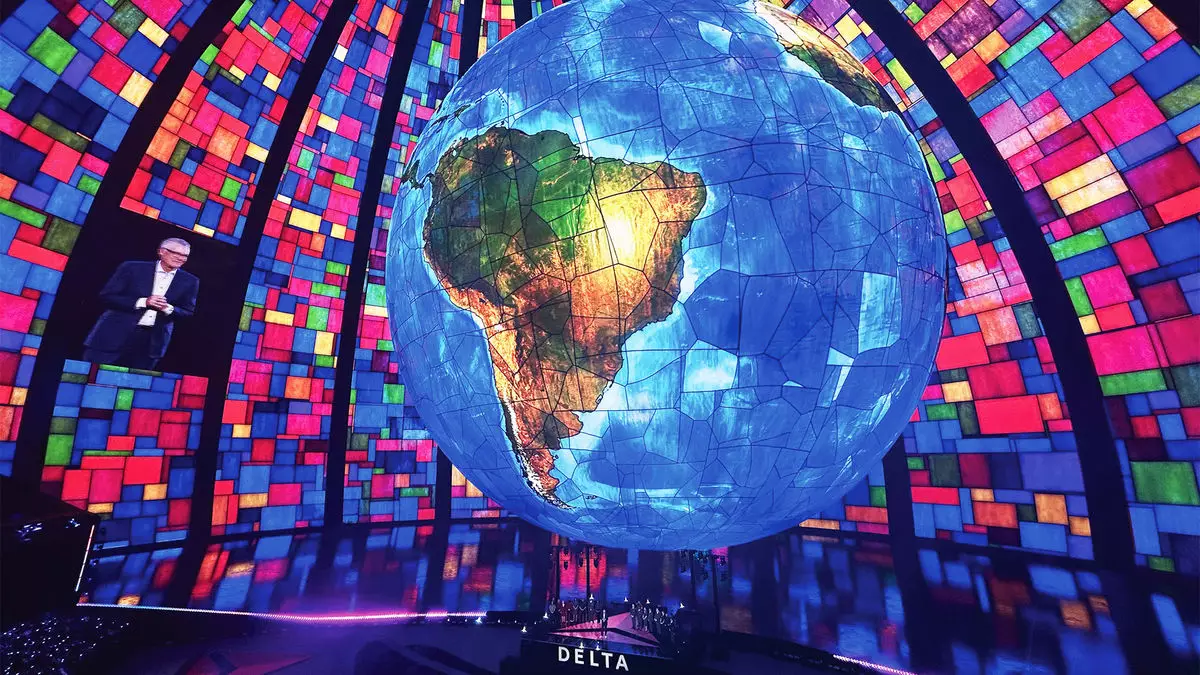In an era where technology permeates every aspect of our lives, the aviation industry is no exception. At the recent Consumer Electronics Show (CES), Delta Air Lines’ CEO Ed Bastian took center stage to portray Delta not just as an airline but as a tech-driven entity ready to redefine air travel. With his presentation delivered from the iconic Sphere arena, Bastian painted an ambitious picture of the future of aviation—one that intertwines technology, artificial intelligence (AI), and personalization to enhance the traveler’s experience.
Bastian’s address was steeped in futuristic possibilities, with the introduction of a new AI-powered application feature called Delta Concierge. Set to launch in the forthcoming year, this tool aims to revolutionize how passengers navigate their journeys by providing seamless, door-to-door service. Imagine a scenario where a traveler is informed about potential delays before their departure, or where travel arrangements are adjusted automatically based on real-time traffic updates. This is the type of advanced personalization Delta is striving for, a vision where AI anticipates every need and reduces stress throughout the journey.
While some critics may argue that such technology could be overly intrusive or lead to privacy concerns, Bastian emphasized the expectation that these tools will enhance choice and convenience. Features such as alerts about passport renewals or visa requirements are just the beginning. Delta Concierge will not only guide passengers through their airport experiences but also aim to facilitate in-flight preferences, creating an atmosphere where travelers feel recognized and valued.
Biometric Integration: A Hands-Free Journey
One aspect of Bastian’s vision that stood out was the future implementation of biometric technology that would allow passengers to travel with no need for physical identification. Imagine passing through security checks, baggage claims, and even boarding gates without the hassle of presenting documents. This “hands-free” concept offers a glimpse into a world where convenience reigns, and the bottleneck often associated with flying is significantly reduced.
However, exploring this ambition raises questions about data security and the management of personal information. While Delta positions itself as a forward-thinking company, maintaining customer trust in an era of heightened awareness surrounding personal data usage will be vital. The balance of convenience and privacy must be addressed to ensure that such futuristic features do not become points of concern for travelers.
As the in-flight experience evolves, Delta’s plans for its Sync entertainment system signal an era of hyper-personalization. The upcoming enhancements, which will feature tailored viewing suggestions and the capability to pick up unfinished content across flights, resonate with today’s digital consumer culture. This synchronized experience could make flying more enjoyable, transforming what has historically been viewed as a mundane aspect of travel.
Moreover, with features like Bluetooth pairing in all cabins and a significantly upgraded recommendation engine coming in 2026, Delta is clearly aiming to elevate the passenger experience to match that of high-end modern entertainment systems. These technological advancements symbolize a major shift in how airlines could engage with passengers; not only would travelers have more choices but a system that learns and evolves with them would foster a deeper, more personal connection to the airline.
While Delta’s vision for the future is captivating, the road ahead will be riddled with challenges. Integrating advanced technologies in the aviation sector is no small undertaking, and the implementation of features like Delta Concierge and biometric scanning will likely encounter regulatory scrutiny and operational hurdles. Airlines must cooperate with government agencies and navigate the complex landscape of air travel regulations, all while managing public perception and potential pushback from travelers wary of new technologies.
Nonetheless, Delta’s investment into this modernized approach presents substantial opportunities for growth and service enhancement. If executed well, the emerging technologies will not only broaden Delta’s competitive edge but also elevate customer loyalty in an industry where satisfaction is paramount.
As Delta Airlines positions itself at the forefront of technological innovation, the possibilities for enriching the traveler experience are limitless. By integrating AI, biometric technologies, and personalized services, Delta is not solely preparing for the future of air travel but is actively shaping it. While challenges will undoubtedly arise, the potential for creating a seamless, engaging, and customer-centric flying experience suggests that the sky may not be the limit for Delta, but merely the beginning.

